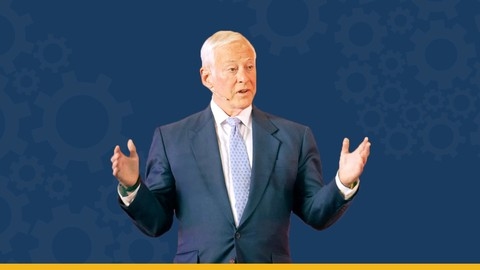Finding the right leadership course can be a daunting task, especially with the overwhelming amount of options available on platforms like Udemy.
You want a course that’s engaging, comprehensive, and taught by experienced instructors, but it should also cater to your specific learning style and goals.
We’ve gone through countless leadership courses on Udemy to find the best options for you.
For the best leadership course overall, we recommend Leadership: Practical Leadership Skills by Chris Croft.
This course stands out for its blend of practical, actionable tips and theoretical foundations.
You’ll learn to define true leadership, understand motivation theories like Maslow’s Hierarchy of Needs, and apply frameworks for deciding how much control to delegate to your team members.
With its clear, conversational lectures and downloadable resources, this course is designed to equip you with the tools and knowledge to become an effective leader.
However, if this specific course doesn’t quite fit your needs, we have a variety of other options available.
Keep reading to discover the best leadership courses on Udemy for different learning levels, styles, and areas of focus.
Leadership: Practical Leadership Skills
The course starts by defining what a true leader is and distinguishing leadership from management.
You’ll learn about John Adair’s influential leadership matrix and hear an anecdote illustrating a leader’s key responsibilities - steering the ship, motivating the team, and planning for the future.
A major focus is on motivation - understanding theories like Maslow’s Hierarchy of Needs and how to apply them.
You’ll get tips on separating praise from criticism, managing different personality types, and using motivators beyond just money.
The course provides 20 practical tips you can implement daily to keep your team motivated.
The curriculum dives deep into leadership styles, drawing from theories like the Tannenbaum & Schmidt Continuum and Situational Leadership.
You’ll learn frameworks for deciding how much control to keep versus delegating to employees based on their competency levels.
The course stresses the importance of delegation, with lectures on empowering your team, overcoming fears about delegation, and following an 8-step process.
Other topics include communicating effectively with your team, performing regular management tasks at a daily/weekly/monthly cadence, and getting your team to solve their own problems.
The course wraps up with a “Management Charter” you can display publicly to commit to improving.
Throughout, you’ll get downloadable documents reinforcing key concepts.
The conversational video lectures use concrete examples to illustrate the academic theories in a practical way.
Leadership: How to Influence, Inspire and Impact as a Leader
This comprehensive course covers everything you need to know about effective leadership.
You’ll start by learning the fundamental differences between a leader and a manager.
Leaders create value, have circles of influence, and lead people, while managers focus on counting value, have circles of power, and manage work.
The course dives deep into leadership traits, behaviors, and styles like situational leadership, path-goal theory, contingency models, servant leadership, and more.
But being a great leader isn’t just about your style - it’s also about your followers.
You’ll explore the importance of followership, different follower styles, and strategies for managing up and building strong relationships with your team.
Speaking of teams, there’s an entire section dedicated to team leadership, covering team types, building high-performing teams, and achieving results.
To truly inspire others, you need to be an authentic leader.
The course guides you through becoming self-aware using tools like the Myers-Briggs Type Indicator (MBTI) and understanding why people should want to follow you.
You’ll also learn how to build trust with stakeholders through integrity, values, actions, and communication.
Creativity is key for any influential leader, so the course dedicates time to overcoming creativity blocks and creating a compelling vision to rally people around.
Naturally, communicating that vision is critical - you’ll dive into leadership communication models, choosing the right channels, managing crises, and more.
Finally, you’ll master the art of influencing others by creating a shared vision, empowering your team, and driving behavior change through techniques like rational persuasion.
Throughout the course, you’ll complete practical exercises to apply what you’ve learned.
With Lorraine’s expertise as a global leadership expert, this course provides a comprehensive roadmap to becoming an inspirational leader who can positively impact any organization.
Management Skills - Team Leadership Skills Masterclass
The course starts by clarifying the difference between management and leadership.
You’ll explore what it means to be a LEAN manager and an ever-learning manager.
This lays the foundation for becoming an influential manager - a key focus area.
You’ll dive deep into influencing skills like assertiveness, using ADISCO (Adult-to-Adult communication), setting a clear vision and SMART goals.
The course teaches you how to influence attitudes, communicate effectively through words and body language, and handle difficult people.
There are activities to apply these concepts.
Next, you’ll learn to be a data-guided manager, getting control of processes and using lead indicators/KPIs to make informed decisions.
The everyday management section covers team meetings, communication, time management, performance management, and delegation.
A major portion is dedicated to LEAN process management using the ProPeC methodology.
You’ll master LEAN thinking, identify wastes like transport, inventory, waiting etc., do root cause analysis, set goals, plan changes using tools like process maps and Gantt charts, and implement in a disciplined manner.
Training your team is another key area - you’ll learn training needs analysis, designing effective training programs, measuring training effectiveness using the Kirkpatrick model.
There’s also a full module on culture change management.
Other highlights include building high-performing teams, understanding team dynamics, individual differences and psychometrics.
You’ll learn core presentation skills - structuring content, public speaking, creating persuasive presentations.
The team lifecycle and recruitment are also covered.
Finally, there are tips on self-care, resilience, work-life balance and the future of management.
The course provides activities, resources and recommended reading throughout.
Lean Leadership Skills, Lean Culture & Lean Management
Taught by Lawrence Miller, a former CEO with extensive experience in lean transformations, the course provides a holistic approach to lean leadership.
The course begins by explaining the fundamentals of lean thinking, culture, and leadership.
Miller emphasizes that lean is not just about manufacturing, but a way of optimizing human performance across any organization.
You’ll learn the importance of continuous improvement, respect for people, and eliminating waste.
A key concept is the “House of Lean” model, which visually represents the technical and social aspects of lean.
Miller dives deep into lean principles like just-in-time, kanban systems, visual management, and going to the “gemba” (where the work happens).
Practical examples, like how a stamping plant reduced die change time from 24 hours to 54 seconds, make the concepts tangible.
But lean is not just about technical practices.
Miller dedicates significant time to the social and cultural side, such as developing a problem-solving mindset, motivating teams, and designing organizational structures that enable continuous flow.
You’ll learn how to facilitate effective team meetings, create visual scoreboards, and apply problem-solving methods like the 5 Whys and PDSA cycle.
A unique aspect of the course is Miller’s emphasis on “whole system architecture” – redesigning an organization’s technical, social, and economic systems together through collaborative design thinking.
You’ll learn how to write a design charter, map processes, dream the ideal future state, and develop implementation plans.
Throughout the course, Miller stresses the role of lean leaders in challenging and serving their teams.
You’ll gain insights into the lean leader’s mindset, such as embracing interdependence, facilitating commitment over control, and modeling desired behaviors.
The course materials include lectures, activities, quizzes, and recommended readings.
Miller encourages a blended learning approach with peers, study circles, and coaching for maximum impact.
The Science of Leadership
The course starts by diving into the four structures of our brain - the reptilian brain (home of survival instincts), paleolimbic brain (how we position ourselves towards others), neolimbic brain (emotions, motivations, personalities), and the prefrontal brain (our supercomputer for higher cognition).
You’ll learn how these areas shape different leadership styles.
It then examines our genetic programming - how our genes influence behaviors like facing danger, avoiding starvation, and managing stress.
You’ll explore a typology of 8 personality types stemming from our genetics.
Next, it looks at how our prior experiences color our perception of the world and motivations.
You’ll learn about the role of intrinsic and extrinsic motivations, the ingredients for employee engagement, and pitfalls like instant gratification, self-evaluation biases, and workaholism.
The course also highlights how our environment and context heavily influence behavior, even more than we realize.
It covers dynamics like group interactions, authority issues, and perception biases.
Towards the end, you’ll get a synthesized model combining all these factors to shape an effective, science-based leadership approach.
Developing Your Team - Teamwork from Forming to Performing
The course starts by emphasizing the importance of teams in today’s organizations and how your future success depends on your ability to form and lead teams effectively.
It covers the purpose and objectives, which include developing a team charter, guiding the team through stages of growth, clarifying roles and decision-making processes, keeping score, motivating the team, and implementing a problem-solving model.
You’ll learn about different team types and go through an activity to define your specific team.
The course then dives into the characteristics of high-performing teams and cultures, such as having a clear purpose, shared values, a passion for improvement, trust, competency, customer focus, and continuous improvement.
A crucial part of the course is organizing your team by developing a team charter that outlines the purpose, responsibilities, principles, communication plan, performance measures, and membership.
You’ll also learn about team roles, running effective meetings with a structured agenda, and the small things that can make a big difference, like having a consistent rhythm and an interruption-free environment.
The course covers the stages of team development (forming, storming, norming, and performing) and how a leader’s role evolves as the team matures.
You’ll assess your team’s maturity level and learn about different decision-making styles, from command to consensus.
Keeping score and motivation are essential for team success.
The course teaches you how to create a balanced scorecard that tracks financial, customer, process, and growth measures.
You’ll develop your own scorecard tailored to your team’s goals.
Problem-solving and continuous improvement are central themes.
The course introduces a problem-solving philosophy that views problems as opportunities for learning and emphasizes addressing issues within the team’s control, gathering facts, and leveraging the team’s collective intelligence.
You’ll learn the PDCA (Plan, Do, Check, Act) problem-solving model and apply it to a real problem.
Finally, the course touches on team-building activities and provides additional resources for further learning.
Giving and Receiving Feedback for Management and Leadership
The course starts by highlighting the importance of giving and receiving feedback constructively.
Lawrence Miller, the instructor, acknowledges that feedback can cause anxiety but argues that it’s essential for managers to coach and develop their teams.
You’ll learn a model for delivering feedback effectively and receiving it positively to facilitate learning and improvement.
Miller emphasizes that failing to provide feedback can cheat both the subordinate and manager out of growth opportunities.
He shares real-world examples, like the Abilene paradox and Enron’s collapse, to illustrate how a lack of honest feedback can send individuals and organizations in the wrong direction.
The course then delves into the characteristics and values that great managers should exhibit, such as integrity, caring, empathy, humility, empiricism, and a pursuit of excellence through continuous improvement.
You’ll explore how these values can create a safe environment for giving and receiving feedback.
Miller provides practical guidelines for giving feedback, such as being specific, focusing on behavior rather than the person, using “I” statements, and maintaining a helpful and sincere manner.
He introduces a model that walks you through steps like asking permission, describing the situation, suggesting alternatives, gaining commitment to action, and agreeing on follow-up.
Importantly, the course covers how to receive feedback effectively.
You’ll learn to listen with empathy, seek clarification, engage in problem-solving, reflect on what’s been said, and take responsibility for actionable items – all while understanding that feedback is not an evaluation of your overall performance.
Throughout the course, you’ll have opportunities to practice giving and receiving feedback with your peers, ensuring you can apply what you’ve learned in real-life situations.
Miller emphasizes the importance of continuous improvement, lifelong learning, and using a scientific, fact-based approach to shape behavior and enhance performance gradually.
He shares inspiring examples, like how an employee named Mary improved her efficiency from 35% to 120% through feedback, data, and engagement.
Think Like a Leader with Brian Tracy
The course starts by emphasizing that leaders are made, not born.
You’ll learn how to adopt the right mindset and find clarity of vision - which Brian says accounts for 85% of success.
Through exercises, you’ll set goals and visualize your ideal future self as a leader.
A major focus is developing integrity as your moral compass.
You’ll explore role models, define your core values, and learn to consistently lead by example.
The strategic planning section teaches skills like being proactive, setting goals systematically, and effective project management.
Importantly, the course covers cultivating courage - taking calculated risks, getting out of your comfort zone, and having difficult conversations.
You’ll also learn motivational leadership, active listening, giving constructive feedback, and empowering your team through communication.
The teamwork module provides insights into choosing cooperation over confrontation, putting employees first, and hiring the right people.
Finally, you’ll learn to be innovative, solution-oriented and exhibit competence through constant learning.
With video lectures from the renowned Brian Tracy and practical exercises, this course promises a comprehensive roadmap to leadership success.
Leadership: The Emotionally Intelligent Leader
This comprehensive course delves into the crucial role of emotional intelligence in effective leadership.
You’ll start by exploring what makes a great leader and the importance of giving and receiving feedback.
The course covers speaking as an emotionally intelligent leader, using phrases that create engaged teams.
You’ll gain insights into self-awareness, a fundamental aspect of emotional intelligence and leadership.
The course then dives into understanding emotional intelligence itself - defining it, distinguishing between EI and EQ, and examining emotions and feelings.
You’ll learn about the emotional climate at work and how to manage emotions effectively.
There’s even a section on artificial intelligence’s limitations regarding emotional intelligence.
Energy management is another key focus, covering the flow and dimensions of energy, energy cycles, and renewal rituals.
You’ll learn practical tips for increasing energy levels through breathing, nutrition, hydration, sleep, exercise, and stress management.
To develop self-awareness, you’ll explore behavioral preferences based on Carl Jung’s and Isabel Briggs Myers’ work.
Through activities, you’ll determine your personality type and how to leverage it for effective leadership.
The course covers coaching skills essential for emotionally intelligent leaders, including the GROW model, listening techniques, and journaling.
You’ll learn about different leadership styles (commanding, democratic, affiliative, etc.) and assess your dominant mode.
Conflict resolution is a crucial aspect, covering trust-building, the increasing intensity of conflict, managing fight-or-flight responses, and using words impactfully.
There’s guidance on leading virtual teams effectively, encouraging technology use, and providing support.
Leadership Principles: Transformational Leadership & Culture
The course starts by highlighting the pivotal role principles play in building trust and unity within organizations.
You’ll learn why principles matter more than ever in our modern, impersonal corporate environments.
The instructors explain how embedding principles into an organization’s structure, systems, and culture is key to recreating the social intimacy and common purpose that drove success in humanity’s hunter-gatherer past.
A major focus is understanding the five forms of capital that lead to sustainable wealth creation - spiritual, social, human, innovation, and financial capital.
The course dives deep into the foundational role of spiritual capital (pursuing a worthy purpose) and social capital (shared values enabling cooperation and trust).
You’ll see data showing how belonging to groups can dramatically improve longevity, underscoring the power of social connections.
The core of the course covers nine transformational leadership principles to build your organization around.
The Purpose Principle teaches communicating an inspiring vision beyond just profits.
The Unity Principle breaks down counterproductive class distinctions, fostering ownership and identity.
You’ll learn the Integrity Principle of acting with honesty beyond what’s legally permitted.
Other key principles include Humility (the foundation for continuous learning), Service (meeting the needs of all stakeholders), Excellence (an ongoing pursuit, not an end state), Engagement (designing for employee ownership), Empiricism (basing decisions on data over dogma) and Diversity (unlocking innovation through differing perspectives).
Practical exercises reinforce applying each principle, like analyzing how Honda creates unity through its organizational habits and systems.
You’ll gain insights into building engagement through team structures and decision processes that give employees true autonomy.
Also check our posts on:










